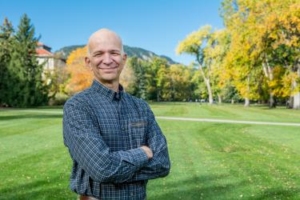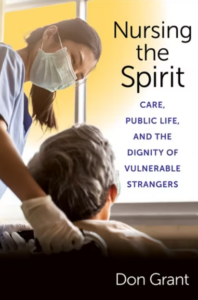Welcome to 7 Questions, our series where we highlight exciting scholars in the field of religion and get to know the person behind the book. For this article, we interviewed Don Grant, whose book Nursing the Spirit: Care, Public Life, and the Dignity of Vulnerable Strangers was recently published with Columbia University Press. You can also check out an excerpt of his book here.
Get to Know Don

Don Grant is Professor of Sociology and Fellow of the Renewable and Sustainable Energy Institute at the University of Colorado Boulder. He also directs his institution’s certificate programs in Social Innovation and Care, Health, and Resilience. He has written on a variety of topics, ranging from racial income inequality, strike violence, and crime to religion, economic development, climate change, and care work. He is the lead author of Super Polluters: Tackling the World’s Largest Sites of Climate-Disrupting Emissions (Columbia University Press 2020), coauthored with Andrew Jorgenson and Wesley Longhofer.
Don Answers Our 7 Questions
Question 1: What sparked the idea to write this book?
I was raised in a religious and politically progressive family. My dad was a United Methodist minister who was involved in the antiwar and civil rights movements of the 1960s. Partly because of the resistance he experienced from those who believed religion should be an entirely private matter, I became interested as a scholar in the tension between religion and modern public life and whether the two might be reconciled.
I came to study nurses largely by accident. During my first sabbatical, I decided to take a break from crunching social survey data in the ivory tower and enter a training program for chaplains at a university hospital where I could experience social life and the existential issues it raises up close. After several weeks of fumbling and bumbling my way as a chaplain intern, I came to rely heavily on nurses in figuring out how to approach patients and address their spiritual needs, and I often found nurses’ recommendations more helpful than the advice I received in the chaplaincy program. Before finishing my time in the chaplaincy program and returning to my work as professor, I decided to launch a study of nurses’ spiritual care. It struck me that the debate about the place of spirituality in modern care settings had too long been dominated by religious and scientific authorities and other “talking heads.” It was time to bring into the conversation the experiences of caregivers themselves—those who actually do the work of caring for strangers.
My engagement with the topic did not stop there, however. Years later I found myself at another academic medical center, but this time as a living liver transplant donor to my dad. This experience gave me glimpses into spiritual care from the perspective of a patient, and what’s more, a patient who was subject to the type of radical biotechnical procedure that some suggest could fundamentally transform human ontology in the future by conceivably upgrading and supplementing the body. Being a liver donor gave me new insight into the precarious place of human qualities like the spiritual in ultramodern care settings.
The book is an outcome of all three of these experiences: as scholar, care giver, and care recipient.
Question 2: What role does the sacred play in relation to your work broadly? Where do you see the sacred or sacred things in this book specifically?
The book addresses a major concern of Max Weber about the fate of caritas, the religious principle that every individual has a spiritual dimension of ultimate importance that makes them sacred and worthy of care. Weber observed that during the so-called Axial Age (800–200 B.C.E), communities first began to recognize all humans, including foreigners, immigrants, enemies, and other strangers, as spiritual beings deserving of protection and nurture. In the years since, however, this fundamental principle of world religions has increasingly been questioned as societies have modernized and developed care systems grounded in scientific approaches that are indifferent, if not hostile, to the notion that humans possess a transcendent quality. Max Weber feared that as religious motives for action were gradually replaced by more scientific motives and understandings, human qualities like the spiritual that had previously ennobled vulnerable strangers would eventually be extinguished, causing institutions to operate “without regard for persons” and dissipating the passion to ameliorate misery. Understood in this broader light, nurses’ spiritual care provides a window into the fate of the Axial ethic and whether its idea that all individuals are inherently sacred and therefore deserving of compassion can still be rendered plausible in modern public life.
Question 3: If you were to describe the book to someone who is unfamiliar with religious and academic jargon, how would you summarize it?
Human anguish has always raised profound spiritual concerns. It stirs up feelings of insecurity, exposes life’s unfairness, and raises troubling questions about the ultimate worth of human lives. However, today most people experience suffering and treatment in hospitals and other impersonal, bureaucratic facilities whose employees are expected to follow scientific, rationalized norms of behavior. This book asks How do professional caregivers—the nurses and other workers who tend to patients—navigate between science and spirituality? More specifically, how willing are nurses to provide spiritual care? Do they talk about spirituality among themselves? Can they describe their work as spiritual without feeling inauthentic? Have they recommended, offered, or provided services meant to enhance patients’ spiritual well-being? And do their storied accounts of interactions with patients enable them to think spirituality and science can co-exist?
Question 4: Who were models or inspirations for you as you wrote this book?
The book was inspired by several academics, including Weber, Arthur Kleinman, Robert Bellah, Hans Joas, Arthur Frank, and others interested in “religion on the edge.” But it was chiefly inspired by the hospital nurses who helped me out as a chaplain intern, participated in my study, and looked after my dad and me during our transplant procedure. They taught me that studying affliction from a “professional distance” is not enough. Scholars must also immerse themselves in local worlds of suffering to appreciate the moral dilemmas of caregiving and, in particular, the challenge of dignifying vulnerable strangers within highly rationalized systems.
Question 5: What was the most difficult thing about writing the book? Did you encounter any unexpected problems or challenges?
The book is composed of three interweaving strands about my time as a chaplain intern, my analyses of nurses’ spiritual care, and my observations as a transplant donor. Braiding and integrating these materials was a challenge. By organizing the text around three different storylines, I tried to illuminate the book’s umbrella theme about caritas from three contrasting viewpoints. By joining the analytical and personal, I also sought to illustrate how academic research might be humanized, how scholarly questions about care are (or can be) intertwined with the lived experience of giving and receiving of care. The danger of retelling personal experiences, of course, is that one treads the slippery slope of subjectivity. Readers will have to judge for themselves whether I lapse into sentimentality and self-indulgence. My hope, though, is that the book will at least suggest how stepping outside academia and into the realm of care can be a valuable means of understanding the social world.
Another challenge I faced was writing about religion during a time when many equate it with fundamentalism and the Religious Right. Therefore, I stress throughout the book that its goal is not to prove a supernatural realm exists, endorse any traditions and practices that allegedly tap into it, let alone promote a political agenda. Rather I am interested in what sociologists like Weber say is the first obligation of religion—to value humanity.

Question 6: What has surprised you the most about the book, either in its writing or reception?
Several of my study’s findings surprised me. For example, contrary to the conventional belief that spiritual care in hospitals is the domain of chaplains, nearly half of nurses think they provide more spiritual care than these religious authorities.
Although many nurses were open to performing these clergy-like roles, other results suggested that they rarely talked about spiritual matters among themselves. A large majority of nurses said they were quite comfortable discussing spiritual matters but they were under the false impression that this was not the case with most of their peers. Hence, a veil of pluralistic ignorance appears to prevent nurses from broaching the topic of spirituality.
Especially surprising was the willingness of most nurses to share with me experiences at work that had a profound impact on their understanding of spirituality. These rarely told stories were often crafted in ways that not only made the spiritual plausible, but also suggested how science and spirituality can coexist.
Question 7: With this book done, what’s up next for you?
I am currently extending my research on dehumanization in modern society by examining the intersection between outgroup hostility and climate change. Specifically, I am interested in whether a new form of partisan conflict – affective polarization – has grown to where it shapes the behavior of major polluters and the ability of democracies’ existing policies and self-correcting systems to curb these actors’ carbon discharges. I also continue to direct two certificate programs at my institution for students pursuing careers in the helping professions and wanting to innovate solutions to societal problems. Outside the academy, I am working with communities to address some of the challenges to caregiving exposed and amplified by the pandemic.
You can order Nursing the Spirit: Care, Public Life, and the Dignity of Vulnerable Strangers here.
